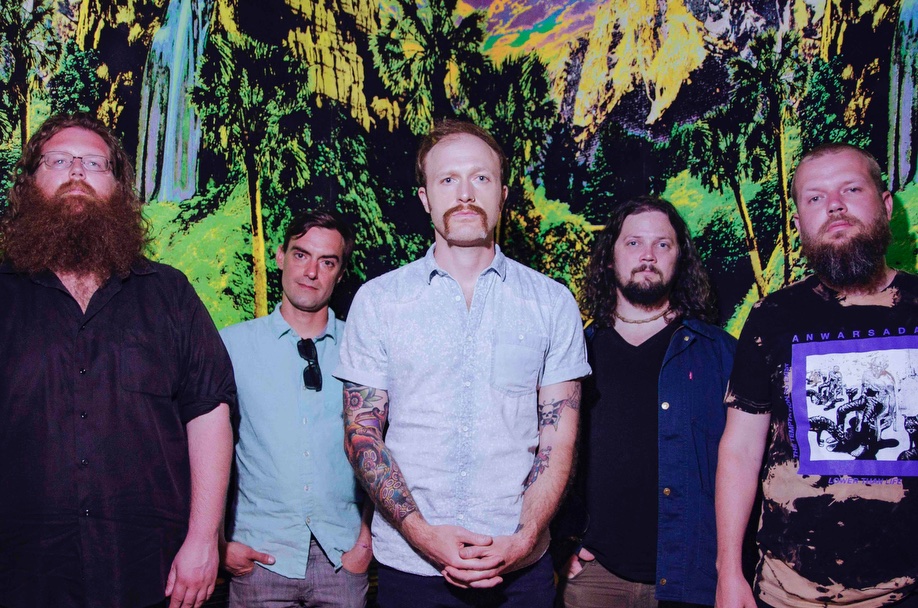Around 5 p.m., Shadwick Wilde, Jim Bob Brown and Aaron West, three-fifths of the indie band Quiet Hollers, pull up to the Logan Street Music Studio. They pack their dimly lit recording space full of musical equipment, and Wilde carries in a 12-pack of Coors Light. Brown offers me one. The rest of the band — drummer Dave Chale, bassist Jake Hellman — is having car trouble, and it takes them another hour to arrive. Once assembled, Quiet Hollers plays through “Medicine,” a single from their new album, Amen Breaks, out this Friday on sonaBLAST! records. The opening guitar riff is rich with trademark indie fuzz, but it would fit in fine on a funky slow jam. Wilde’s voice is light, lilting: “I never felt it so bad that I needed medicine.” When the music stops, we sit down to talk through the origins of the song.
Louisville Magazine: What was the inspiration for "Medicine"?
Shadwick Wilde: Let’s get real deep, real personal. So, I struggle with depression. It’s genetic. Probably environmental too. Not in a severe, need-to-be-hospitalized kind of way, but just kind of a nagging, constant pull to the abyss. My partner, she has a panic disorder, which is much more severe. Anyways, she’s medicated for that, and part of medicating for something like that is going through different prescriptions to figure out what works and what doesn’t work. When you withdraw from medication like that it becomes sort of a mood stabilizer, for day to day resistance. That’s what that song is about.
The lyrics and the music seem cyclical. Was that intentional?
Jim Bob Brown: It does feel like a circle, but that’s what the song is about. The day to day cycle of dealing with these things. You have to take it on every single day, whether you want to self-prescribe or need to be prescribed by somebody else, but it’s definitely a cycle.
Jake Hellman: I think when I first heard the riff, the groove was so tight that we never really had to beat that. We worked with that groove for ever and it just always sounded amazing. I think when (Wilde) sent the demo to us it was just that riff.
Were you reluctant to write this song?
Wilde: Yeah, yeah, definitely, because it is a really personal struggle. And it wasn’t so much my own struggle — because that’s basically all that I write about. But to talk about her panic disorder, while I was writing it — well, she’s a psychologist, so she knows a lot about this kind of stuff, it’s her job to talk about it. And we both feel that it’s very important to talk about these things in the public in a non-judgemental kind of a way. So I had to ask her if she would be comfortable about not only me writing the song and singing the song, but really talking about where it really came from. I would say the hardest part was getting that personal and that literal in a song, but it was important to do.
How long did it take you to write it?
Wilde: Well, it’s hard to say how long it takes to write a song, because it kind of comes in fits and starts. I had the hook for the longest time, and then in the studio I was messing around and came up with that funky little riff and I thought, “Whoa, that doesn’t sound like anything I’ve written before.” And then I brought it to the band, and I said, “It needs something else.”
So why this song as the debut?
Hellman: I think it’s because when we play it live, the first time there were people dancing, and I knew that was "the one" on the album. People got a good response from it. People, not even knowing the song, were really enjoying it. There were other reasons, but that’s one of the reasons that sticks out to me.
Wilde: And also it deals with mental illness — which, there’s a lot of that on the record. The different forms that it takes, the different problems that it causes, questions that it brings up.
Would you say that the rest of the record sounds similar to “Medicine”?
Everyone: Nah. No.
Brown: I feel like this one, compared to the last record, those songs sounded very similar. And the songs from the second album sounded very cohesive, there was definitely a broad range of writing. And this one I feel is — it’s collective, but it’s definitely spider-webbing. If we were to take one single from this album, and make that a basis for the next album, I don’t think we could really do that. Take one song and be like, “Oh, it’s gonna turn into this later on.” Because (this album) is all over the spectrum.
Wilde: I think we are all of the mindset that we don’t want to be of a genre. And write whatever we want to write and play wherever the music takes us. And more broadly, I think genre is over. I’m just sayin’. All the bands that I’m following right now — like Kendrick, Arcade Fire — aren’t trying to cater to this one niche.
You can catch Quiet Hollers at this year's Forecastle Festival. Stay up to date with the band's news by following them on Facebook, Instagram and Twitter.
Cover photo courtesy of Quiet Hollers


